English Words in Action, Group E
(a variety of English words which have developed through history and are currently used in our modern age)
Simply click on this banner (or the following link) and you will be on your way to stimulate your brain for greater word comprehension with quizzes based on some of the words in this unit.
2. Illustrating an excited expectancy, a keenness, or zealousness: Elvin's teachers say he is one of the most eager students they have known at the high school.
Shirley was accused of being an eavesdropper on her brother's private telephone conversations.
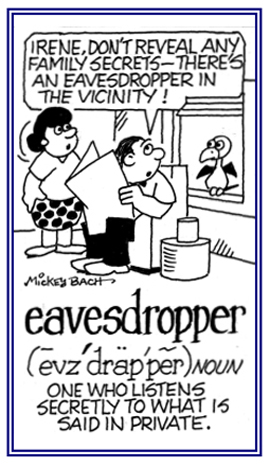
Go to this Word A Day Revisited Index
so you can see more of Mickey Bach's cartoons.
Egeria is originally the name of a Roman nymph or goddess who was an adviser to Numa Pompilius, a legendary Roman king.
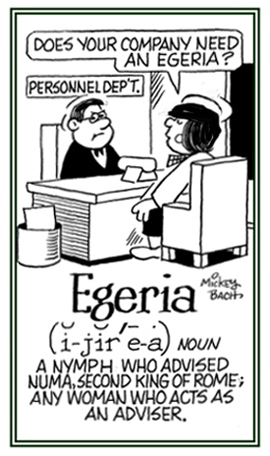
Go to this Word A Day Revisited Index
so you can see more of Mickey Bach's cartoons.
This family tries to eke out a living by selling wood carvings.
2. Etymology: from Old English ecan, "to increase".2. A unique and stylish refinement: Joe was very impressed with Leah’s élan when he came to pick her up at home and gave her a bouquet of flowers.
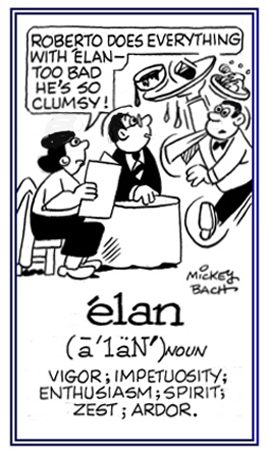
Go to this Word A Day Revisited Index
so you can see more of Mickey Bach's cartoons.
2. Etymology: from Dutch eland, "elk"; from late Middle Dutche elen, elant; from German elen, elend; from Lithuanian ellenis, "stag".
2. Etymology: from Latin elicere, "to draw forth"; from ex-, "out" + -licere, combining form of lacere, "to entice".
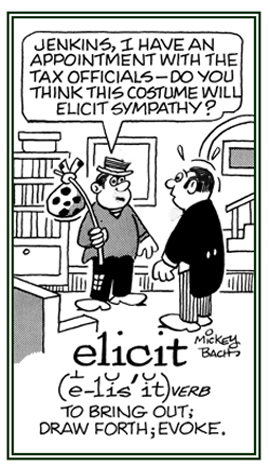
Go to this Word A Day Revisited Index
so you can see more of Mickey Bach's cartoons.
2. Hard to comprehend, baffling: For many people, mathematics is full of elusive concepts.
2. Something that is difficult to grasp or to understand: Rodney was told that the speaker's elusiveness was an attempt to avoid telling the truth.
2. Etymology: "to make excessively thin"; from Latin emaciatus, and emaciare "to make lean, to waste away"; from ex-, "out" + macies, "leanness"; from macer, "thin".
Janette was so emaciated that she was too weak to walk and so she had to use a supporting walker to get around.
Because of the severe drought, many of the emaciated cattle on Jake's ranch were not expected to live much longer.
The forest ranger explained that the emaciation of the deer in the area was caused by the extremely cold winter.
2. To add imaginary details to a narrative to make it more interesting or acceptable: While Tom was telling his story of how he had found a necklace, he embroidered his narrative by making it sound like he had discovered a vast amount of jewelry!
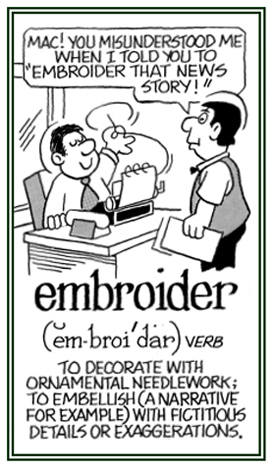
Go to this Word A Day Revisited Index
so you can see more of Mickey Bach's cartoons.
2. Etymology: from Japanese e, "picture" + moji, "letter, character".
Expressing Tears of Joy

Expressing Disappointment

There are hundreds of other images showing emojis which can be seen by clicking on this Google link.


There are hundreds of other images showing emojis which can be seen by clicking on this Google link.
- :-( [sad]
- :-) [smiling]
- (^o^) [laughing]
- (?_?) or (@_@) [don't know or sense of confusion]
- (^_-) or (^_~) [winking]
- >:-o [angry]
- <@:) [curly hair dunces hat]
- (-_-) [bored face]
3. Etymology: a portmanteau word of the English words emotion (or emote) and icon: "On web forums, instant messenges and online games, text emoticons are often automatically replaced with small equivalent images, all of which are now called emoticons."
Links to all of the groups of English words in action, Groups A to Z.
You may see the bibliographic list of sources of information for these words in action.

